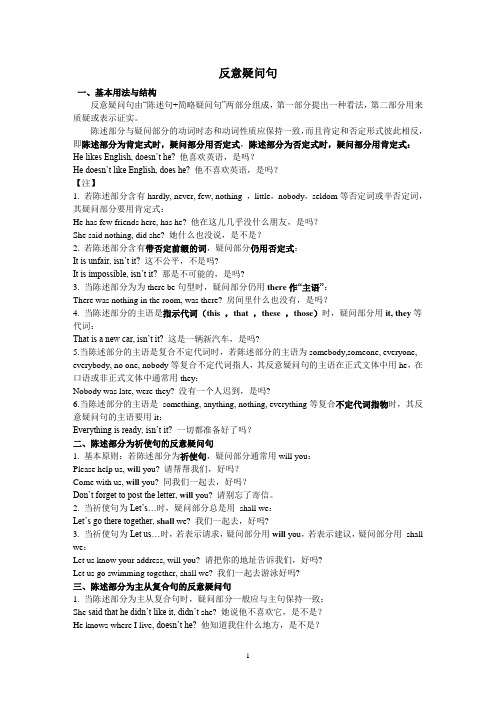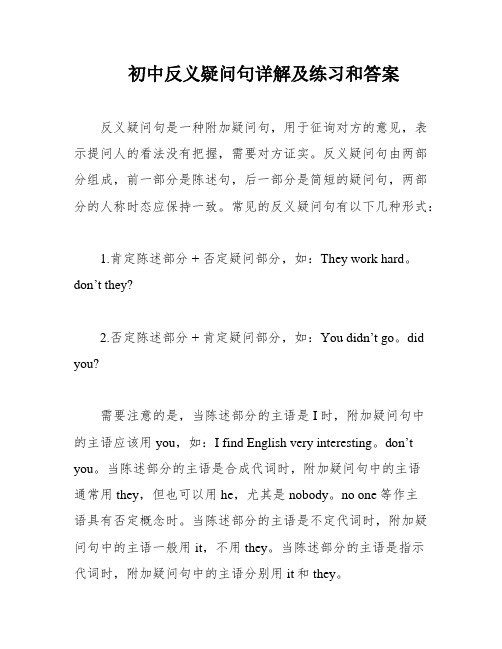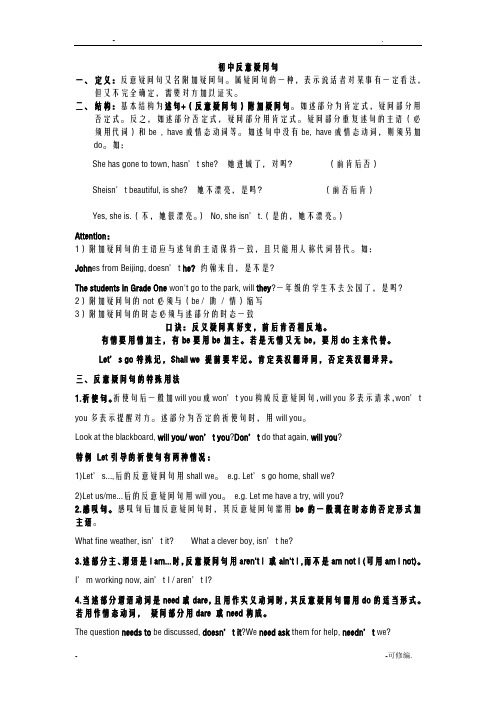初中反义疑问句讲解
初中英语反义疑问句详细讲解--整合

反义疑问句一、英文中的反意疑问句。
1、什么是反意疑问句英语中,反意疑问句是由陈述句和附在其后的附加疑问句组成。
其中附加疑问句是对陈述句所说的事实或观点提出疑问,起证实作用,一般用于证实说话者所说的事实或观点。
(表示说话者对某事有一定看法,但又不完全确定,需要对方加以证实。
)翻译为“是吗”2。
反意疑问句的回答,回答时,如果情况属实,用Yes加上反问句的倒装肯定句;若果情况不属实,则用No加上反问句的倒装否定句。
例如You were moved by your students, weren’t you?情况属实:Yes, I were. ?was情况不属实:No, I weren't。
注意事项:附加问句的主语应与陈述句的主语保持一致,且只能用人称代词替代。
如:You come from Beijing, don’t you?你来自北京,是不是?The students in Grade One won’t go to the park,will they? 一年级的学生不去公园了,是吗?二、反意疑问句中问句部分的动词与陈述部分的动词在语气上成相反的对应关系,即:肯定+否定?否定+肯定?如:You can’t do it, can you?你不能做它,是吗?They are very late for the meeting,aren’t they? 他们开会迟到了,是吗?三.当陈述句中含有be动词,助动词,或是情态动词时,反问句部分由这些词加上主语人称代词构成,Be动词包括:am, is,are,was,were助动词有:do,does, did, have(用在完成时), has(用在完成时)等情态动词有:can,could, may,might, must,will, would, shall, shoul例如:She is a lovely girl,isn’t she? 她是一个可爱的女孩,是吗?He will go home, won't he? 他要回家了,是吗?She doesn't like to eat popcorn,does she? 她不喜欢吃爆米花,是吗?The baby won’t sleep early,will it?小宝宝睡得不早,是吗?注意:He has supper at home every day,doesn’t he? (不能用hasn’t he?)他每天在家吃晚饭,是吗?They have known the matter, haven't they?(不能用don’t they?)他们已经知道那事情了,是吗?四.当陈述句中只含有行为动词时,若动词加了s,就用does,若动词为原形,就用do,动词为过去式,则用did,例如:You cleaned your house last week,didn't you?你上周打扫了你的房间,是吗?Your father plays the computer very well, doesn’t he ?你父亲电脑技术很好,是吗?They look so happy today,don’t they?你今天看起来很高兴,是吗?五.(1)反意疑问句的陈述部分带有little,few,never, hardly, seldom,nobody, nothing, no one,none,neither, barely,scarcely等否定意义的词时,问句部分用肯定式.如:①She never tells a lie,does she?(不用doesn’t she?) 她从不说谎,是吗?②He was seldom late,was he?(不用wasn't he?) 他几乎不迟到,是吗?3。
初中英语反义疑问句精讲

反义疑问句反义疑问句(The Disjunctive Question) 即附加疑问句。
它表示提问人的看法,没有把握,需要对方证实。
反义疑问句由两部分组成:前一部分是一个陈述句,后一部分是一个简短的疑问句,两部分的人称时态应保持一致。
主语一般词语附加疑问句中主语用和主语一致的主语,用主格。
不定代词当陈述部分的主语是(1)everyone,no one,nobody 等时,后面的疑问句应表示为:Everyone is in the classroom, aren't they? (基本不用单数,但也可用he)Nobody will go, will they?(2) everything,anything,nothing,something时,附加疑问句中主语一般用it 不用they(3)this,that,或those,these时,附加疑问句中主语用it和they.特殊句型(1)当陈述部分有never,seldom, hardly,few,little,barely, scarcely, nothing 等否定意义的词时,后面的反意疑问句则为肯定形式:There are few apples in the basket, are there?He can hardly swim, can he?They seldom come late, do they?(2)当陈述部分含有否定意思的词是unhappy,dislike,unfriendly等含有否定词缀的派生词,也就是有un-前缀、-less后缀等含有词缀而意思否定的词,当做肯定句处理,疑问部分要用否定形式。
如:He looks unhappy,doesn't he?他看上去不高兴,不是吗?The girl dislikes history,doesn't she?这女孩不喜欢历史,不是吗?含有think, believe, suppose, imagine, expect等动词后接宾语从句构成的主从复合句在构成反意疑问句时,视情况不同有两种不同的构成方式。
初中英语反义疑问句详细讲解 整合

反义疑问句之阿布丰王创作一、英文中的反意疑问句.1、什么是反意疑问句英语中,反意疑问句是由陈说句和附在其后的附加疑问句组成.其中附加疑问句是对陈说句所说的事实或观点提出疑问,起证实作用,一般用于证实说话者所说的事实或观点.(暗示说话者对某事有一定看法,但又不完全确定,需要对方加以证实.)翻译为“是吗”2. 反意疑问句的回答,回答时,如果情况属实,用Yes加上反问句的倒装肯定句;若果情况不属实,则用No加上反问句的倒装否定句.例如You were moved by your students, weren’t you?情况属实:Yes, I were. ?was情况不属实:No, I weren’t.注意事项:附加问句的主语应与陈说句的主语坚持一致,且只能用人称代词替代.如:You come from Beijing, don't you?你来自北京,是不是?The students in Grade One won't go to the park, willthey? 一年级的学生不去公园了,是吗?二、反意疑问句中问句部份的动词与陈说部份的动词在语气上成相反的对应关系,即:肯定+否定?否定+肯定?如:You can’t do it, can you? 你不能做它,是吗?They are very late for the meeting, aren’t they? 他们开会迟到了,是吗?三.当陈说句中含有be动词,助动词,或是情态动词时,反问句部份由这些词加上主语人称代词构成,Be动词包括:am, is, are, was, were助动词有:do, does, did, have(用在完成时), has (用在完成时)等情态动词有:can, could, may, might, must, will, would, shall, shoul例如:She is a lovely girl, isn’t she? 她是一个可爱的女孩,是吗?He will go home, won’t he? 他要回家了,是吗?She doesn’t l ike to eat popcorn, does she? 她不喜欢吃爆米花,是吗?The baby won’t sleep early, will it?小宝宝睡得不早,是吗?注意: He has supper at home every day,doesn’t he? (不能用hasn’t he?)他每天在家吃晚饭,是吗?They have known the matter, haven’t they? (不能用don’t they?)他们已经知道那事情了,是吗?四.当陈说句中只含有行为动词时,若动词加了s,就用does, 若动词为原形,就用do,动词为过去式,则用did,例如:You cleaned your house last week, didn’t you?你上周清扫了你的房间,是吗?Your father plays the computer very well, doesn’t he ?你父亲电脑技术很好,是吗?They look so happy today, don’t they?你今天看起来很高兴,是吗?五.(1)反意疑问句的陈说部份带有little, few, never, hardly, seldom,nobody, nothing, no one, none, neither, barely, scarcely等否定意义的词时,问句部份用肯定式.如:①She never tells a lie, does she?(不用doesn’t she?) 她从不说谎,是吗?②He was seldom late, was he?(不用wasn’t he?) 他几乎不迟到,是吗?3. Nobody phoned while I was out, did they?4. He is hardly able to swim, is he?5. There is little ink in your pen, is there? (2).含有否定含义的词在陈说部份作动词的宾语时,其反意疑问句用肯定结构,也可以用否定结构.例如:You got nothing from him, did you? 你从他那儿什么也没获得,是吗?(3)当陈说部份所含的否定词是通过加前缀或后缀构成的,其后的反意疑问句依然用否定结构.例如:It is unfair, isn't it? 这不公平,是吧?六、反意疑问句的陈说部份为I am……时,问句部份习惯上用aren’t I?暗示.如: I am a very honest man, aren’t I? 我是个很诚笃的人,是吗?七.陈说部份的主语为不定代词something, anything, nothing, everything时,问句部份的主语用it.如:①Something is wrong with the computer, isn’t it? 电脑有问题了,是吗?②Nothing has happened to them, has it? 他们什么事也没发生,是吗?八、1.陈说部份的主语为不定代词somebody (someone), anybody(anyone), nobody (no one), everybody (everyone) none,neither时,问句部份的主语用he或 they,这时问句动词的数应和he或 they一致.如:Someone has taken the seat, hasn’t he? 有人已经坐了位置,是吗?Everyone has done their best in the game, haven’tthey? .每个人在角逐中已经尽力了,是吗?九.陈说部份的主语是不定代词one时,反意疑问句的主语可以用one,也可用you(美式英语用he).例如:One should be ready to help others, shouldn't one? 每个人都应该乐于助人,是吧?十.陈说部份的主语是指示代词this或that时,反意疑问句的主语用it,当陈说部份的主语是指示代词these或those时,其反意疑问句的主语用they.例如:This is a plane, isn't it? 这是一架飞机,是吗?These are grapes,aren't they? 这些是葡萄,是吗?十一.陈说部份为祈使句1)若为let’s引导,反问句用shall we? 例如Let’s go home together, shall we? 让我们一起回家,好吗?2)若为let us/me引导和其余的任何一般的否定祈使句,都用will you, 例如Let us stop to rest, will you? 让我们停下休息,好吗?Don’t make any noise, will you?别弄出噪音,好吗?3)一般的肯定祈使句则用will you 或won’t you 都行,例如:Do sit down, won’t you?/ will you? 请坐,好吗?You feed the bird today, will you? 今天你喂鸟,是吗?Please open the window, will you? (won’t you?) 翻开窗,好吗?十:陈说部份为There (Here) + be + 主语时,问句部份用动词+there (here)?形式.①There are two cakes on the plate, aren’t there? 碟子里有两块蛋糕,是吗?②Here is a story about Mark Twain, isn’t here? 这是关于马克吐温的故事,是吗?十一. 感叹句.感叹句后加反意疑问句时,其反意疑问句需用be的一般现在时态的否定形式.例如:What fine weather, isn't it? 多好的天气啊,是吧?十二. 当陈说部份谓语动词是need, dare, used to,且这些词被用作实义动词时,其反意疑问句需用do的适当形式.若dare和need 为情态动词, 疑问部份用dare 或need构成.例如:We need to help them, don’t we?You daren’t go there, dare you?十三. 当陈说部份主语是从句、不定式(短语)、动词-ing形式时,反意疑问句的主语应该用it.例如:What you need is more important, isn't it?你需要的工具更重要,是吧?十四. 陈说部份有had better时,反意疑问句中要用hadn't.例如:We had better go to school at once, hadn't we? 我们现在最好马上去上学,好吗?18.当陈说部份含有情态动词must时,我们便要分析一下must的含义.如果must 作“一定;要;必需”讲,反意疑问句须用mustn't或needn't;而当must作推测意义“一定是;肯定”讲时,反意疑问句则需根据must后的动词原形选用相应的形式.当must后面接的是完成时是,反意疑问句部份的动词可用haven’t 也可didn’t (一般句中有明确的时间状语时用didn’t)例如:You must go now, needn’t you ?You mustn’t smoke here, must you?You must be hungry now, aren’t you ?You must have watched that football match last night,didn’t you?19. 陈说部份是有and, or, for, but 等引起的并列结构时,疑问部份与邻近分句坚持一致.We must study hard, or we shall fail, shan’t we?20. 陈说部份用neither…nor, not only…but also,等连接主语时,疑问部份用复数代词.Neither you nor I can do it, can we?Not only she but also I passed the exam, didn’t we?21.陈说部份的主语是each of...结构时,附加疑问句在强调整体时用they,看成个别时用he.22. 陈说部份有would rather +v.,疑问部份多用 wouldn't +主语.He would rather read it ten times than recite it,wouldn't he?23 陈说部份有You'd like to +v. 疑问部份用wouldn't +主语.You'd like to go with me, wouldn't you?24, 陈说部份的主语后有同位语从句或定语从句修饰时,疑问部份仍对逐句主语进行反问.The news that they failed their driving test disappointed him, didn’t ?他们没有通过驾驶考试的消息让他失望了,对分歧毛病?25. 陈说部份的谓语动词是暗示愿望的wish,主语为I时,疑问部份经常使用may I 且前后两部份均用肯定形式.I wish to go home now, may I?反义疑问句1、遵循“前否后肯”或“前肯后否”的原则:Jim isn’t in Class Four, is he?2、前后两句主语相同 :Mr Zhang has been here for four years, hasn’t he?3、主语纷歧致的若干情况如下(需牢记):4、谓语纷歧致的若干情况如下(需牢记):。
初中反义疑问句讲解

反意疑问句一、基本用法与结构反意疑问句由“陈述句+简略疑问句”两部分组成,第一部分提出一种看法,第二部分用来质疑或表示证实。
陈述部分与疑问部分的动词时态和动词性质应保持一致,而且肯定和否定形式彼此相反,即陈述部分为肯定式时,疑问部分用否定式,陈述部分为否定式时,疑问部分用肯定式:He likes English, doesn’t he? 他喜欢英语,是吗?He doesn’t like English, does he? 他不喜欢英语,是吗?【注】1. 若陈述部分含有hardly, never, few, nothing ,little,nobody,seldom等否定词或半否定词,其疑问部分要用肯定式:He has few friends here, has he? 他在这儿几乎没什么朋友,是吗?She said nothing, did she? 她什么也没说,是不是?2. 若陈述部分含有带否定前缀的词,疑问部分仍用否定式:It is unfair, isn’t it? 这不公平,不是吗?It is impossible, isn’t it? 那是不可能的,是吗?3. 当陈述部分为为there be句型时,疑问部分仍用there作“主语”:There was nothing in the room, was there? 房间里什么也没有,是吗?4. 当陈述部分的主语是指示代词(this ,that ,these ,those)时,疑问部分用it, they等代词:That is a new car, isn’t it? 这是一辆新汽车,是吗?5.当陈述部分的主语是复合不定代词时,若陈述部分的主语为somebody,someone, everyone, everybody, no one, nobody等复合不定代词指人,其反意疑问句的主语在正式文体中用he,在口语或非正式文体中通常用they:Nobody was late, were they? 没有一个人迟到,是吗?6.当陈述部分的主语是something, anything, nothing, everything等复合不定代词指物时,其反意疑问句的主语要用it:Everything is ready, isn’t it? 一切都准备好了吗?二、陈述部分为祈使句的反意疑问句1. 基本原则:若陈述部分为祈使句,疑问部分通常用will you:Please help us, wil l you? 请帮帮我们,好吗?Come with us, will you? 同我们一起去,好吗?Don’t forget to post the letter, will you? 请别忘了寄信。
初中英语反义疑问句精讲

反义疑问句反义疑问句(The Disjunctive Question) 即附加疑问句。
它表示提问人的看法,没有把握,需要对方证实。
反义疑问句由两部分组成:前一部分是一个陈述句,后一部分是一个简短的疑问句,两部分的人称时态应保持一致。
主语一般词语附加疑问句中主语用和主语一致的主语,用主格。
不定代词当陈述部分的主语是(1)everyone,no one, nobody 等时,后面的疑问句应表示为:Everyone is in the classroom, aren't they? (基本不用单数,但也可用he)Nobody will go, will they?(2) everything,anything,nothing,something时,附加疑问句中主语一般用 it 不用 they(3)this,that,或those,these时,附加疑问句中主语用it和they.特殊句型(1)当陈述部分有never,seldom, hardly,few,little,barely, scarcely, nothing 等否定意义的词时,后面的反意疑问句则为肯定形式:There are few apples in the basket, are there?He can hardly swim, can he?They seldom come late, do they?(2)当陈述部分含有否定意思的词是unhappy,dislike,unfriendly等含有否定词缀的派生词,也就是有un-前缀、-less后缀等含有词缀而意思否定的词,当做肯定句处理,疑问部分要用否定形式。
如:He looks unhappy,doesn't he?他看上去不高兴,不是吗?The girl dislikes history,doesn't she?这女孩不喜欢历史,不是吗?含有think, believe, suppose, imagine, expect等动词后接宾语从句构成的主从复合句在构成反意疑问句时,视情况不同有两种不同的构成方式。
(完整版)初中英语 反义疑问句的用法归纳

初一反义疑问句【反义疑问句】(一)概念:反意疑问句是由陈述句和附在其后的附加疑问句组成。
其中附加疑问句是对陈述句所说的事实或观点提出疑问,起证实作用,一般用于证实说话者所说的事实或观点。
(二)要点注意:1、反意疑问句前后两部分谓语应是:“肯定陈述+否定疑问”或“否定陈述+肯定疑问”。
2、简略问句如果是否定式:not应与be,do,will等系动词、助动词、情态动词缩写。
3、简略问句的主语不用名词,应用人称代词。
4、陈述部分含“too...to”时,是否定句。
(三)用法:1) 陈述部分I am时,疑问部分要用aren't I.I'm as tall as your sister,aren't I?(我和你姐姐一样高,对吗?)2) 陈述部分用no, nothing, nobody, never, few, little, seldom, hardly等否定含义的词时,疑问部分用肯定含义。
如:The old man made no answer, did he?Jim is never late for school, is he?3) 陈述部分有情态动词have to +v. (had to + v.),疑问部分常用don't +主语(didn't +主语)。
We have to get there at eight tomorrow, don't we?used to,疑问部分用didn't +主语或usedn't +主语。
He used to take pictures there, didn't he? / usedn't he?had better(最好)+ v. 疑问句部分用hadn't you?You'd better read it by yourself, hadn't you?4) 陈述部分有would rather(宁可、宁愿)+v.,疑问部分多用wouldn't +主语。
初中反义疑问句详细讲解

反义疑问句一、1、什么是反意疑问句英语中,反意疑问句是由陈述句和附在其后的附加疑问句组成。
其中附加疑问句是对陈述句所说的事实或观点提出疑问,起证实作用,一般用于证实说话者所说的事实或观点。
翻译为“是吗”2.反意疑问句的回答,回答时,如果情况属实,用Yes加上反问句的倒装肯定句;若果情况不属实,则用No加上反问句的倒装否定句。
例如You were moved by your students, weren’t you?情况属实:Yes, I were.情况不属实:No, I weren’t.二、反意疑问句中问句部分的动词与陈述部分的动词在语气上成相反的对应关系,即:肯定+否定?否定+肯定?如:①You can’t do it, can you?你不能做它,是吗?②They are very late for the meeting, aren’t they?他们开会迟到了,是吗?三.当陈述句中含有be动词,助动词,或是情态动词时,反问句部分由这些词加上主语人称代词构成,Be动词包括:am, is, are, was, were助动词有:do, does, did, have(用在完成时), has(用在完成时)等情态动词有:can, could, may, might, must, will, would, shall, should例如:She is a lovely girl, isn’t she?她是一个可爱的女孩,是吗?He will go home, __won’t__ __he__?他要回家了,是吗?She doesn’t l ike to eat popcorn, __does__ _she___?她不喜欢吃爆米花,是吗?The baby won’t sleep early, will it?小宝宝睡得不早,是吗?注意:①He has supper at home every day,doesn’t’t he? (不能用hasn’t he?) 他每天在家吃晚饭,是吗?②They have known the matter, haven’t they? (不能用don’t they?)他们已经知道那事情了,是吗?四.当陈述句中只含有行为动词时,若动词加了s,就用does, 若动词为原形,就用do,动词为过去式,则用did,例如:You cleaned your house last week, _didn’t___ __you__?你上周打扫了你的房间,是吗?Your father plays the computer very well, __doesn’t__ ___he _?你父亲电脑技术很好,是吗?They look so happy today, _don’t ___ _they___?你今天看起来很高兴,是吗?五.反意疑问句的陈述部分带有little, few, never, hardly, seldom,nobody, nothing,barely, scarcely等否定意义的词时,问句部分用肯定式。
初中英语 反义疑问句的用 法归纳

初一反义疑问句【反义疑问句】(一)概念:反意疑问句是由陈述句和附在其后的附加疑问句组成。
其中附加疑问句是对陈述句所说的事实或观点提出疑问,起证实作用,一般用于证实说话者所说的事实或观点。
(二)要点注意:1、反意疑问句前后两部分谓语应是:“肯定陈述+否定疑问”或“否定陈述+肯定疑问”。
2、简略问句如果是否定式:not应与be,do,will等系动词、助动词、情态动词缩写。
3、简略问句的主语不用名词,应用人称代词。
4、陈述部分含“too...to”时,是否定句。
(三)用法:1) 陈述部分I am时,疑问部分要用 aren't I.I'm as tall as your sister,aren't I? (我和你姐姐一样高,对吗?)2) 陈述部分用 no, nothing, nobody, never, few, little, seldom, hardly等否定含义的词时,疑问部分用肯定含义。
如:The old man made no answer, did he? Jim is never late for school, is he?3) 陈述部分有情态动词have to+v. (had to + v.),疑问部分常用don't +主语(didn't +主语)。
We have to get there at eight tomorrow, don't we?used to,疑问部分用didn't +主语或 usedn't +主语。
He used to take pictures there, didn't he? / usedn't he?had better(最好) + v. 疑问句部分用hadn't you?You'd better read it by yourself, hadn't you?4) 陈述部分有would rather(宁可、宁愿)+v.,疑问部分多用wouldn't +主语。
反义疑问句讲解及答案

反义疑问句讲解及答案反义疑问句是一种附加疑问句,用于表示提问人的不确定或需要对方证实的看法。
这种句型由两部分组成,即陈述句和简短的疑问句,两部分的人称时态应保持一致。
陈述部分为肯定式时,疑问部分为否定式,反之亦然。
例如,昨天她病了,是吗?你没去,是吧?在特殊情况下,祈使句也可以构成反义疑问句。
通常情况下,祈使句后会加上will you或won't you,用于表示请求或提醒对方注意。
当祈使句以Let开头时,反义疑问句有两种情况:以shall we或shan't we结尾,或以will you或won't you结尾。
例如,回家吧,好吗?让我试一试,行吗?当陈述部分含有I think (believe。
suppose。
)that。
结构时,反义疑问句的主语必须是第一人称,并且须与从句的主、谓语保持一致。
如果是非第一人称,则反义疑问句的主语应与主句的主语相一致。
当陈述部分为I(We) don’t think(believe。
suppose。
consider)+that从句时,问句部分的动词和主语仍与that从句保持一致且用肯定式。
例如,我认为他不会来,对吗?他认为她会来,不是吗?我们不相信这个消息是真的,是吗?When using a statement in the form of subject + said (told。
reported。
asked。
) + that clause for a tag n。
the verb and subjectof the n part should agree with those of the main clause。
For example:①They said that you had finished your work。
didn't they。
(Not "hadn't you?")②Kate told you that she would go there。
初中反义疑问句详解及练习和答案

初中反义疑问句详解及练习和答案反义疑问句是一种附加疑问句,用于征询对方的意见,表示提问人的看法没有把握,需要对方证实。
反义疑问句由两部分组成,前一部分是陈述句,后一部分是简短的疑问句,两部分的人称时态应保持一致。
常见的反义疑问句有以下几种形式:1.肯定陈述部分 + 否定疑问部分,如:They work hard。
don’t they?2.否定陈述部分 + 肯定疑问部分,如:You didn’t go。
did you?需要注意的是,当陈述部分的主语是I时,附加疑问句中的主语应该用you,如:I find English very interesting。
don’t you。
当陈述部分的主语是合成代词时,附加疑问句中的主语通常用they,但也可以用he,尤其是nobody。
no one等作主语具有否定概念时。
当陈述部分的主语是不定代词时,附加疑问句中的主语一般用it,不用they。
当陈述部分的主语是指示代词时,附加疑问句中的主语分别用it和they。
5.在正式场合,如果陈述部分以代词one作主语,附加疑问句中的主语也应该用one。
在非正式场合,可以用you或he 代替。
例如:One should always be careful。
shouldn’t one。
或者 can you?One must fulfill his duty。
mustn’t he?6.如果陈述部分用I’m…结构,附加疑问部分一般用aren’t I。
例如:I am feeling good today。
aren’t I?7.当陈述句为there be结构时,附加疑问句中的主语也应该用there。
例如:There’s no way to f ix it。
is there?There’s something strange here。
XXX?8.当陈述部分带有seldom。
hardly。
never。
rarely。
few。
little。
反义疑问句的用法归纳及回答举例初中

反义疑问句的用法归纳及回答举例初中
摘要:
一、反义疑问句的用法归纳
1.反义疑问句的构成
2.反义疑问句的回答方式
3.反义疑问句的注意事项
二、反义疑问句的回答举例
1.肯定回答举例
2.否定回答举例
正文:
一、反义疑问句的用法归纳
1.反义疑问句的构成
反义疑问句通常由两部分组成:一个陈述句和一个简短的疑问句。
陈述句和疑问句之间通常有一个逗号分隔,而且疑问句部分常常以“难道不是吗?”等反问语气词结尾。
例如:“你不喜欢吃苹果,难道不是吗?”
2.反义疑问句的回答方式
当反义疑问句用于询问对方意见时,回答时要根据事实情况给出肯定或否定的回答。
如果事实情况与陈述句一致,回答为肯定;如果事实情况与陈述句相反,回答为否定。
例如,对于“你不喜欢吃苹果,难道不是吗?”这个问题,如果对方确实不喜欢吃苹果,回答应该是“是的,我不喜欢。
”
3.反义疑问句的注意事项
在使用反义疑问句时,要注意陈述句和疑问句的一致性。
如果陈述句是肯定形式,疑问句部分也应该是肯定形式;如果陈述句是否定形式,疑问句部分也应该是否定形式。
此外,反义疑问句通常用于表示对某事不确定或想要得到对方确认的情况下,所以要根据实际情况适当使用。
二、反义疑问句的回答举例
1.肯定回答举例
张三问:“你不喜欢吃苹果,难道不是吗?”
李四回答:“是的,我不喜欢。
”
2.否定回答举例
张三问:“你不喜欢吃苹果,难道不是吗?”
李四回答:“不,我喜欢吃苹果。
初中反意疑问句讲解及口诀

初中反意疑问句一、定义:反意疑问句又名附加疑问句。
属疑问句的一种,表示说话者对某事有一定看法,但又不完全确定,需要对方加以证实。
二、结构:基本结构为述句+(反意疑问句)附加疑问句。
如述部分为肯定式,疑问部分用否定式。
反之,如述部分否定式,疑问部分用肯定式。
疑问部分重复述句的主语(必须用代词)和be , have或情态动词等。
如述句中没有be, have或情态动词,则须另加do。
如:She has gone to town, hasn’t she? 她进城了,对吗?(前肯后否)Sheisn’t beautiful, is she? 她不漂亮,是吗?(前否后肯)Yes, she is.(不,她很漂亮。
)No, she isn’t.(是的,她不漂亮。
)Attention:1)附加疑问句的主语应与述句的主语保持一致,且只能用人称代词替代。
如:John es from Beijing, doesn’t he?约翰来自,是不是?The students in Grade One won't go to the park, will they?一年级的学生不去公园了,是吗?2)附加疑问句的not必须与(be / 助/ 情)缩写3)附加疑问句的时态必须与述部分的时态一致口诀:反义疑问真好变,前后肯否相反地。
有情要用情加主,有be要用be加主。
若是无情又无be,要用do主来代替。
Let’s go特殊记,Shall we 提前要牢记。
肯定英汉翻译同,否定英汉翻译异。
三、反意疑问句的特殊用法1.祈使句。
祈使句后一般加will you或won’t you构成反意疑问句,will you多表示请求,won’tyou多表示提醒对方。
述部分为否定的祈使句时,用will you。
Look at the blackboard, will you/ won’t you?Don’t do that again, will you?特例Let引导的祈使句有两种情况:1)Let’s...,后的反意疑问句用shall we。
初中英语反义疑问句精讲

反义疑问句反义疑问句(The Disjunctive Question) 即附加疑问句。
它表示提问人的看法,没有把握,需要对方证实。
反义疑问句由两部分组成:前一部分是一个陈述句,后一部分是一个简短的疑问句,两部分的人称时态应保持一致。
主语一般词语附加疑问句中主语用和主语一致的主语,用主格。
不定代词当陈述部分的主语是(1)everyone,no one,nobody 等时,后面的疑问句应表示为:Everyone is in the classroom, aren't they? (基本不用单数,但也可用he)Nobody will go, will they?(2) everything,anything,nothing,something时,附加疑问句中主语一般用it 不用they(3)this,that,或those,these时,附加疑问句中主语用it和they.特殊句型(1)当陈述部分有never,seldom, hardly,few,little,barely, scarcely, nothing 等否定意义的词时,后面的反意疑问句则为肯定形式:There are few apples in the basket, are there?He can hardly swim, can he?They seldom come late, do they?(2)当陈述部分含有否定意思的词是unhappy,dislike,unfriendly等含有否定词缀的派生词,也就是有un-前缀、-less后缀等含有词缀而意思否定的词,当做肯定句处理,疑问部分要用否定形式。
如:He looks unhappy,doesn't he?他看上去不高兴,不是吗?The girl dislikes history,doesn't she?这女孩不喜欢历史,不是吗?含有think, believe, suppose, imagine, expect等动词后接宾语从句构成的主从复合句在构成反意疑问句时,视情况不同有两种不同的构成方式。
- 1、下载文档前请自行甄别文档内容的完整性,平台不提供额外的编辑、内容补充、找答案等附加服务。
- 2、"仅部分预览"的文档,不可在线预览部分如存在完整性等问题,可反馈申请退款(可完整预览的文档不适用该条件!)。
- 3、如文档侵犯您的权益,请联系客服反馈,我们会尽快为您处理(人工客服工作时间:9:00-18:30)。
反意疑问句专题一、基本用法与结构反意疑问句由“陈述句+简略疑问句”两部分组成,第一部分提出一种看法,第二部分用来质疑或表示证实。
陈述部分与疑问部分的动词时态和动词性质应保持一致,而且肯定和否定形式彼此相反,即陈述部分为肯定式时,疑问部分用否定式,陈述部分为否定式时,疑问部分用肯定式:He likes English, doesn’t he? 他喜欢英语,是吗?He doesn’t like English, does he? 他不喜欢英语,是吗?【注】1. 若陈述部分含有hardly, never, few, nothing ,little,nobody,seldom等否定词或半否定词,其疑问部分要用肯定式:He has few friends here, has he? 他在这儿几乎没什么朋友,是吗?She said nothing, did she? 她什么也没说,是不是?2. 若陈述部分含有带否定前缀的词,疑问部分仍用否定式:It is unfair, isn’t it? 这不公平,不是吗?It is impossible, isn’t it? 那是不可能的,是吗?3. 当陈述部分为为there be句型时,疑问部分仍用there作“主语”:There was nothing in the room, was there? 房间里什么也没有,是吗?4. 当陈述部分的主语是指示代词(this ,that ,these ,those)时,疑问部分用it, t hey等代词:That is a new car, isn’t it? 这是一辆新汽车,是吗?5.当陈述部分的主语是复合不定代词时,若陈述部分的主语为somebody,someone, everyone, everybody, no one, nobody等复合不定代词,其反意疑问句的主语在正式文体中用he,在口语或非正式文体中通常用they:Nobody was late, were they? 没有一个人迟到,是吗?6.当陈述部分的主语是something, anything, nothing, everything等复合不定代词时,其反意疑问句的主语要用it:Everything is ready, isn’t it? 一切都准备好了吗?Nothing is important, is it? 没有什么重要的,不是吗?二、含情态动词的反意疑问句1. 基本原则:在通常情况下,当陈述部分含有情态动词时,疑问部分会重复前面同样的情态动词:He can speak English, can’t he?他会说英语,是吗?We shouldn’t go, should we? 我们不应该去,对不对?2. 当陈述部分含有must时,要分两种情况:①若must表示“必须”或“有必要”,疑问部分用mustn’t 或needn’t:You must leave at once, mustn’t [needn’t] you? 你必须(有必要)马上离开,是吗?但是若陈述部分有mustn’t表示禁止,疑问部分要must:You mustn’t laugh, must you? 你不准笑,知道吗?②若must表示推测,疑问部分不能用must,而应根据must后的动词结构采用相应的动词形式:He must be tired,isn’t he? 他一定累了,是吗?三、陈述部分为祈使句的反意疑问句1. 基本原则:若陈述部分为祈使句,疑问部分通常用will you:Please help us, wil l you? 请帮帮我们,好吗?Come with us, will you? 同我们一起去,好吗?Don’t forget to post the letter, will you? 请别忘了寄信。
2. 当祈使句为Let’s…时,疑问部分总是用shall we:Let’s go there together, shall we? 我们一起去,好吗?3. 当祈使句为Let us…时,若表示请求,疑问部分用will you,若表示建议,疑问部分用shall we:Let us know your address, will you? 请把你的地址告诉我们,好吗?Let us go swimming together, shall we? 我们一起去游泳好吗?四、陈述部分为主从复合句的反意疑问句1. 当陈述部分为主从复合句时,疑问部分一般应与主句保持一致:She said that he didn’t like it, didn’t she? 她说他不喜欢它,是不是?He knows where I live, doesn’t he? 他知道我住什么地方,是不是?当陈述部分为I think (believe, suppose) that...等时,疑问部分通常与从句保持一致(注意否定的转移):I think that it is too short,isn’t it? 我认为它太短了,对不对(它太短吗)?I don’t think he will come, will he? 我认为他不会来,对吗(他会来吗)?【注】这类用法主要限于主语为第一人称且think等动词为一般现在时的情形。
五、几种特殊情况的反意疑问句1. 当陈述部分是I’m…时,疑问部分通常用a ren’t I:I’m wrong,aren’t I? 我错了,是吗?I’m older than you, aren’t I? 我年纪比你大,对不对?2. 当陈述部分是I wish…时,疑问部分通常用may II wish to go with them, may I? 我想同他们一起去,可以吗?3. 当陈述部分有had better时,疑问部分用had:He’d better leave here, hadn’t he? 他最好离开这儿,是吗?Would better ,疑问部分would()1. Don’t forget to give Polly some food and change her water, _______?A. shall weB. will youC. won’t youD. do you()2. There is little juice in the glass, _________?A. is thereB. isn’t thereC. is it()3. ---He’s seldom late for school, ___________?---No. He is used to going to school early.A. isn’t heB. has heC. hasn’t heD. is he()4.---This bus is always late, _________?---Sure, it is.A. is not itB. i sn’t itC. isn’t the busD. doesn’t it ()5.---You’re new here, ________?----Yes, I’m from Dujiangyan. I came here last week.A. do youB. don’t youC. are youD. aren’t you ()6. You used to be outgoing, ?A. do youB. don’t youC. didn’t youD. did you ()7. He has never watched such an important match , _____ he?A. hasn'tB. hasC. isD. isn't()8.They have to work at once,______ they?A. haveB. haven'tC. doD. don't()9. She often feels tired,______ she?A. doesn'tB. doesC. isD. isn't()10. Let's take a short rest, ______?A. do weB. aren't weC. will youD. shall we()11. Hundreds of people lost their lives in the accident,_______ they?A. don'tB. didn'tC. doD. did()12. ---Lily didn't come to school, did she?---____. She was ill in bed.A. No, she didB. Yes, she did.C. No, she didn't.D. Yes, she didn't()13.---She isn't a teacher, is she?---_____. She works in a hospital.A. No, she isB. Yes, she is.C. No, she isn't.D. Yes, she isn't()14.Lily looks like Lucy,_______?A. is LilyB. isn't sheC. does LillyD. doesn't she()15.Tom often has lunch at school,_____?A. doesn't TomB. doesn't heC. does TomD. doesn't he()1.He hardly hurt himself in the accident___________?A. doesn’t heB. didn’t heC. did h eD. does he()2. Let’s search the Internet for some information about famous people,______?A. will youB. won’t youC. shall we()3.Eric’s never seen a three-D movie at the cinema,_______?A.hasn’t he B.has he C.isn’t he D.is he()4.---He didn’t go to the lecture this morning, did he?----______. Though he was not feeling very well.A. No, he didn’t.B. Yes, he did.C. No, he did.D. Yes, he didn’t.()5.—He’s already back to Australia, _________?— _________. He is on a visit to Shanghai.A. isn’t he; NoB. hasn’t he; YesC. isn’t he; YesD. hasn’t he; N ()6.—She doesn’t like geography,does she?— ___________ .A. Yes,she doesB. Yes,she doesn’tC. No,she does ()7. He’s flown to Hainan for a holiday, _______ he?A. isn’tB. hasn’tC. wasn’t()8. ---- Let’s go skating,_______?---- OK. Let’s go.A. do youB. don’t youC. wil l youD. shall we()9. ---There is little milk in the milk bag, ________ there?---OK. I’ll get you a new bag.A. isB. isn’tC. aren’tD. are()10. Bob, you watched the fashion show last night, ________?A. we ren’t youB. didn’t youC. haven’t youD. won’t you ()11. I don’t think she has gone to Beijing, _______?A. has sheB. hasn’t sheC. do ID. don’t I()12. There is no important information in the newspaper, _______?A. isn’t thereB. is itC. is there()13. There are two libraries in this city, _______?A. aren’t thereB. aren’t theyC. are two()14. Mom, my grandfather goes for a walk after supper every day, _______?A. does heB. is heC. doesn’t heD. isn’t he ()15. Liu Qian has made “magic” a hot word, _______ he?A. doesn’tB. didn’tC. hasn’tD. isn’t()16.---You aren’t a professional athlete, are you?---______. I am just a football fan.A. Yes, I amB. No, I’m notC. Of courseD. Sometimes。
